"Baseball's My Life": Ramones Guitarist, Johnny Ramone, Was All About Diamond Action
The Rock'n'Roll Hall of Famer grew up a Yankees fan, and could have easily made his mark with a Louisville Slugger than his 1965 Mosrite.
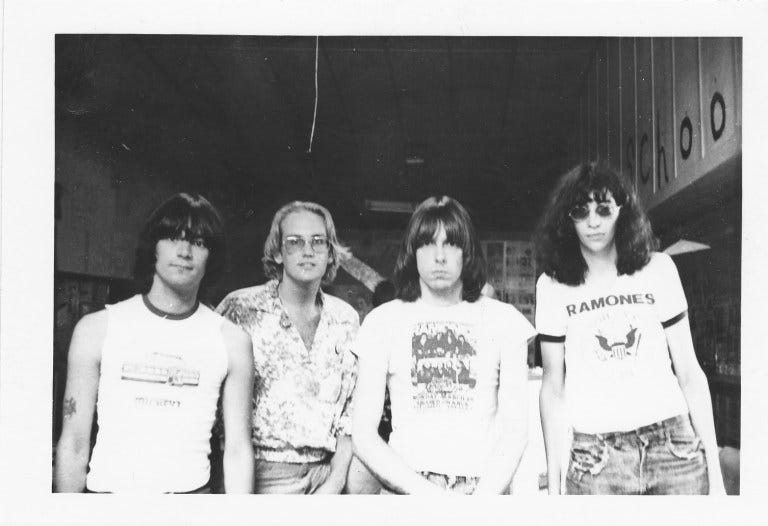
Baseball used to have very little to do with rock’n’roll, and vice versa. For a couple decades, now, rock of various stripes has been routinely blared over the speakers in sports arenas and stadiums, often to maddening repetition.
The Ramones’ “Blitzkrieg Bop” is one example of stadium exposure, but it’s also been featured in many sports-related video games (MLB 08: The Show, NHL 11 and NHL 2K9, among others).
“Beat on the Brat”: Who’s to Blame?
In January 1976, though, The Ramones recorded “Beat on the Brat” (“with a baseball bat,” as the lyrics continue). Knowing Johnny Ramone grew up a massive New York Yankees fan might lead you to surmise he wrote the song.
While Johnny may have contributed (Ramones’ credits are sometimes murky, with the band freely crediting all members, while only one or two were usually creatively responsible), fingers seem to point in lead singer Joey’s direction. Joey passed away in 2001, three years before Johnny.
According to author (The Ramones, 2005) and English professor, Nicholas Rombes, ‘twas Joey who conjured up the threatening tune, as he recounted for Rombes: “I lived in Birchwood Towers in Forest Hills with my mom and brother. It was a lower-class neighborhood, with a lot of trashy lower class women who had horrible brat kids who were obnoxious.
“There was a playground with women sitting around and a kid screaming, a horrible kid just running around rampant with no discipline whatsoever. The kind of kid you just want to kill. You know, ‘beat on the brat with a baseball bat’ just came out. I just wanted to kill him.”
According to Punk Magazine co-founder, Legs McNeil, in his (and Gillian McCain’s) “Please Kill Me: The Uncensored Oral History of Punk,” Dee Dee Ramone concurs, at least to a degree: “Joey saw some mother going after a kid with a bat in his lobby, and wrote a song about it.”
Rock’n’Roll High School
Guitarist Johnny Ramone, like the other three original members of the influential punk rockers (Joey, Dee Dee, and Tommy), hailed from Forest Hills, just north of Jackie Robinson Parkway in the New York City borough of Queens.
In fact, in October 2016, New York City and Queens honored the band’s 40th anniversary by naming the corner of 67th Avenue and 110th Street in front of Forest Hills High School (their alma mater), “The Ramones Way”:
Johnny once detailed how his love of baseball all but distracted him from his main job, laying down tracks for the band’s Subterranean Jungle, their seventh album, in 1982: “We did three covers, but I was happy with the guitar sound. I was watching the [Milwaukee] Brewers-[St. Louis] Cardinals World Series when we were recording it.”
The Ramones (1974-1996) recorded 14 studio albums and seven live albums, most for Sire/Warner Bros. Records, and were inducted into the Rock & Roll Hall of Fame in 2002:
Animal Boy
John Cummings was born October 8, 1948, on the day Game 3 of the World Series between the Cleveland Indians and the Boston Braves was underway, a series eventually won by the Indians, 4-2.
He died, at 55, from prostate cancer on September 15, 2004, on a day his beloved Yankees beat the Kansas City Royals, 3-0, on the strength of two doubles and a Derek Jeter homer.
Johnny was a devoted fan of the Yankees since the mid-1950s, when, at age 7, he saw Mickey Mantle play. That explains his undying love for baseball.
He was present for The Beatles’ concert at the New York Mets’ Shea Stadium, August 15, 1965, two months shy of his 17th birthday.
To witness that transformative pop-cultural event in a venue that normally houses the great American pastime tells us all we need to know about the convergence of Johnny Ramone’s two greatest loves.
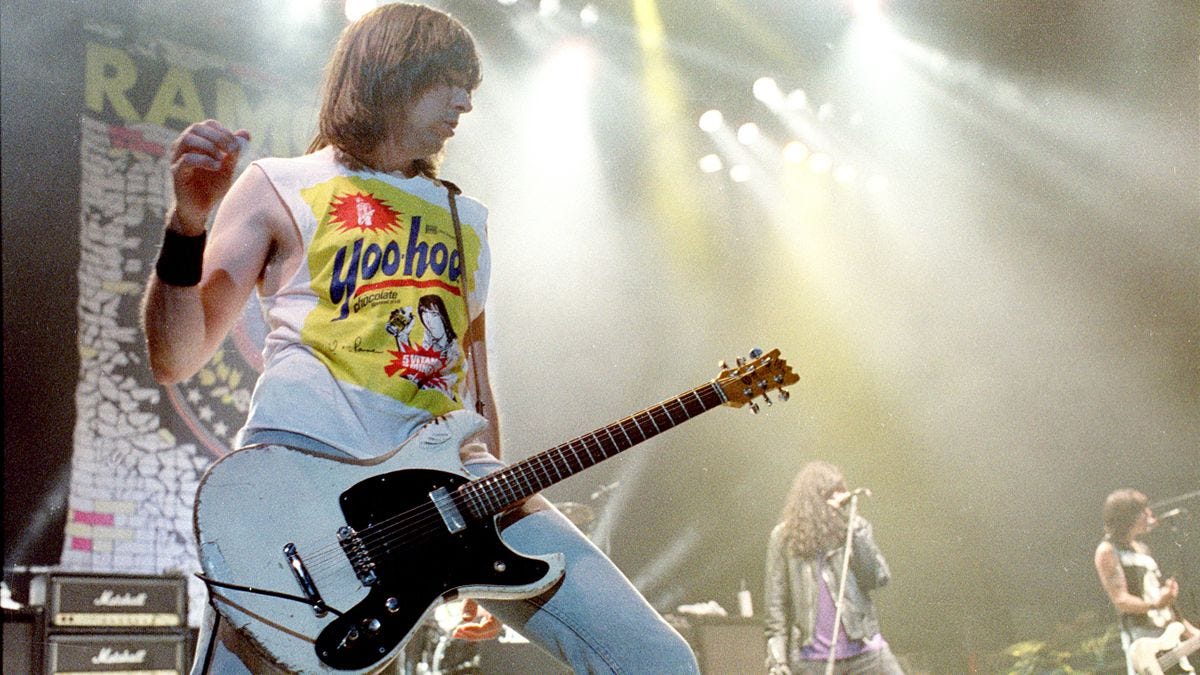
“I’ve always thought you’re better off playing shorter songs.”
Johnny, from his 2012 posthumous autobiography, Commando, zeroes in on that Beatles performance and its ultimate influence on his band: “I’ve always thought you’re better off playing shorter songs. Ramones songs were basically structured the same as regular songs, but played fast, so they became short.
“When I saw the Beatles at Shea Stadium, they played a half-hour show. I figured that if the Beatles played a half-hour at Shea Stadium, the Ramones should only do about fifteen minutes. You get in your best material, and leave them wanting more. I don’t think anyone should play for more than an hour.”
Brain Drain
Once ranked number 28 on the “100 Greatest Guitarists of All Time” list in Rolling Stone magazine, John grew up with a father who let him get away with very little.
In Ramones’ tour manager Monte Melnick’s 2003 book, On the Road with The Ramones, John is quoted as saying: “My father would get on these tangents about how he never missed a day’s work. I broke my big toe the day I had to go pitch a Little League game and he’s going, ‘What are you – a baby? What did I do, raise a baby? You go play.’
“‘And even though my toe was broken, I had to go pitch the game anyway. It was terrible. It would always be like that. I’m glad he raised me like that but it would always be, ‘What are you – sick? You’re not sick. What did I raise – a baby? I never missed a day’s work in my life.’ Then I went to military school, and in military school, you couldn’t call in sick.”
Johnny’s father died in 1979 while the band was in LA recording the End of the Century album, their fifth. Legendary record producer Phil Spector was hired to twiddle the knobs on this hoped-for breakthrough LP.
He was pale, numb, and shell-shocked.
Drummer Marky Ramone offers this account (from his 2015 autobiography, Punk Rock Blitzkrieg: My Life As a Ramone) of how Johnny learned of his dad’s death during recording:
“John’s father had died of a heart attack. It was a complete shock. He was only sixty-two. It was obviously very sad. He had recently retired and moved with John’s mother to Florida. There was such a thing as the American Dream, and there was also the American nightmare. The nightmare was to spend your entire adult life doing hard labor in return for a few golden years and then get shortchanged. I had seen it many times before, and it wasn’t going to be me if I could help it.
“When we saw John in the lounge a minute later, he was pale, numb, and shell-shocked. One bookend to his life was John Wayne, and the other was his father. He idolized his dad. He was always trying to please him, to prove himself. Even in the Ramones. And now he was on his own.
“When John came back, he looked worn-out and not just from jet lag. He had flown a triangle around the country to put things in order, comfort his mother, and be strong for everyone who came to the funeral. He had no time to even begin sorting out what his father’s passing meant to him. But beneath the bags under John’s eyes was a little smile, which he explained to us.”
Beane Around the Block
“You know how I found out that you were a baseball fan, Johnny? I had read somewhere that you knew John Wetteland.” These words came from former Oakland A’s GM Billy Beane, addressing Johnny Ramone in a 2002 interview with ChinMusic!, a defunct Bay Area magazine, reprinted in this 2012 article on AthleticsFarm.com.
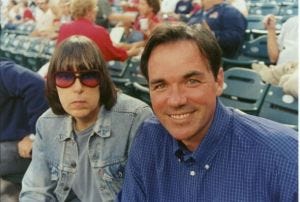
Johnny Ramone replied: “I met Wetteland when Peter Gammons [ESPN] came over one day. He wanted to do a piece on baseball and rock & roll. He brought me over to Dodger Stadium and I got to meet Wetteland. And I was always a big fan.”
Beane: “Yeah, I actually played with John in Detroit briefly when he got drafted over there in spring training. And at that point we were exchanging [2019 Rock & Roll Hall of Fame inductees] Roxy Music CDs.”
“Baseball’s my life…and watching old movies.”
Later, in the Beane/Ramone interview, Johnny revealed: “I read baseball books all the time. Baseball’s my life…and watching old movies.”
Beane responded: “I actually just gave Please Kill Me to Scott Hatteberg (a self-taught guitar player), our first baseman.”
With the Houston Astros’ recent successes, though, thought by many to be a blueprint similar to Beane’s and the A’s Moneyball tactic of “winning through poverty” (and careful drafting), Johnny Ramone had this to say to Beane, regarding the A’s and their budget “pittance” at the time, in their 2002 chat:
“$40 million…unbelievable! I see teams always getting these over-priced veterans who don’t produce when you can bring up young guys that’ll probably give you the same type of production. And you guys seem to be doing that.”
Doubtless, words that might reflect Johnny’s assessment of the 2017 and 2021 Houston Astros, were he alive to witness their first World Series championship and their 2019 march to “Take it Back.”
From Spring 2002, Boston Red Sox fan, Jay Hale of pleasekillme.com, enjoys a rare baseball chat with Johnny via telephone:
Listing To Starboard
The March 18, 2012 issue of New York Magazine published several top 10 lists created by Johnny, a lifelong list-maker. Two of his lists, not surprisingly, were baseball-related:
EIGHTIES BALLPLAYERS
Rickey Henderson
Mike Schmidt
Cal Ripken
Wade Boggs
Ryne Sandberg
Andre Dawson
Robin Yount
Tim Raines
George Brett
Tony Gwynn
NINETIES BALLPLAYERS
Greg Maddux
Roger Clemens
Barry Bonds
Ken Griffey Jr.
Mark McGwire
Jeff Bagwell
Mike Piazza
Craig Biggio
Tom Glavine
Sammy Sosa
Baseball caps off to Johnny for not loading these Top Tens with Yankees, as he could have easily done. His 90s list is, of course (now with the benefit of hindsight), packed with players who have come under the shadow of illegal “enhancements.”
An impressive list, nonetheless, populated as it is, with two Astros (Biggio and Bagwell), both Hall of Famers, with one ranking above Piazza, and both ranking higher than Sosa, in Johnny’s eyes. Noticeably absent from either list, though, is Nolan Ryan, who last pitched in 1993.
Finally, Johnny Ramone’s All-Time Top Ten looked like this:
ALL-TIME TOP TEN
Baseball
Rock and roll
Politics
Elvis
Horror films
Film
Rock films
Science-fiction films
Reference books
Television
Cat-fancier, baseball fanatic, influential guitarist… Johnny Ramone was a rare rock star: A lifelong Republican in a Democrat-filled rock’n’roll firmament. He famously called Ronald Reagan, “The best President in my lifetime,” in an interview.
During his 2002 Rock & Roll Hall of Fame induction speech, Johnny included this in his acceptance speech: “God bless President (George) Bush, and God bless America.”




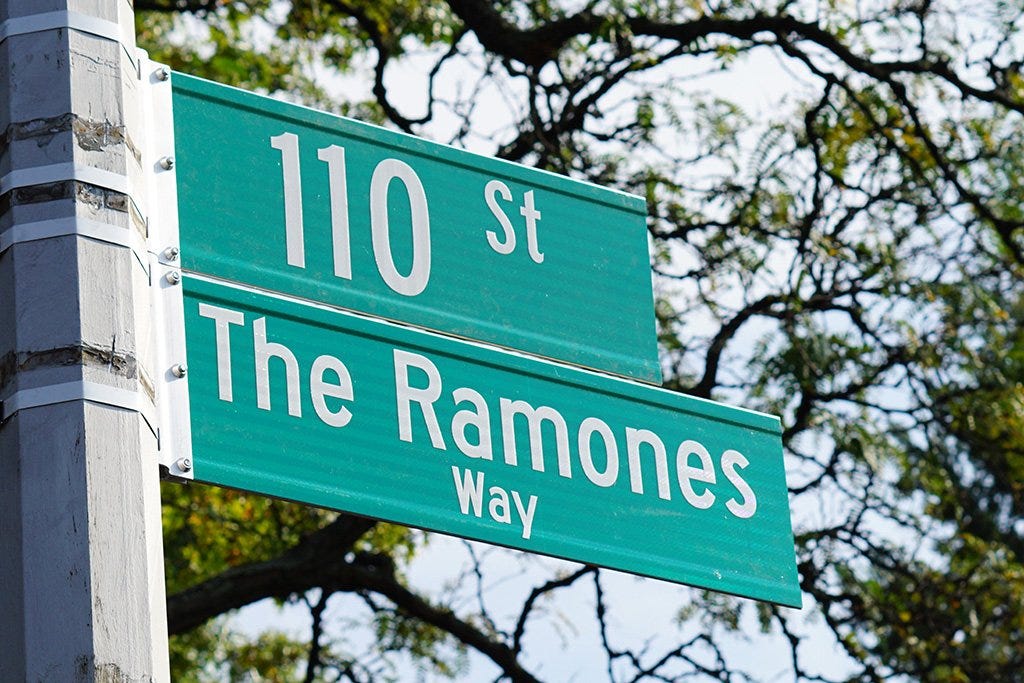
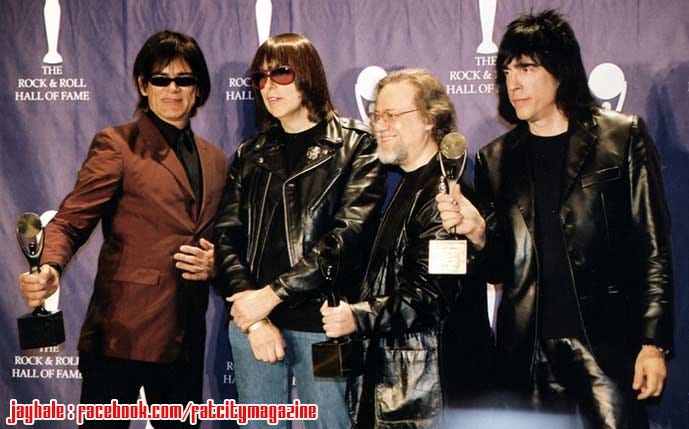


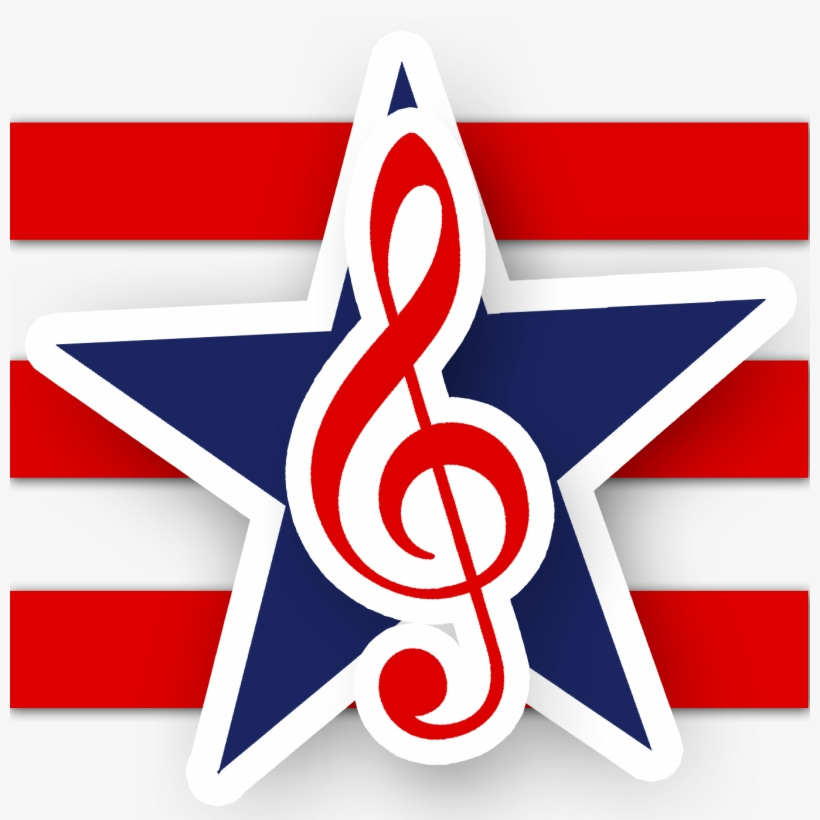
Cool stories, Brad. I like the way you mashed up your two loves into one story!